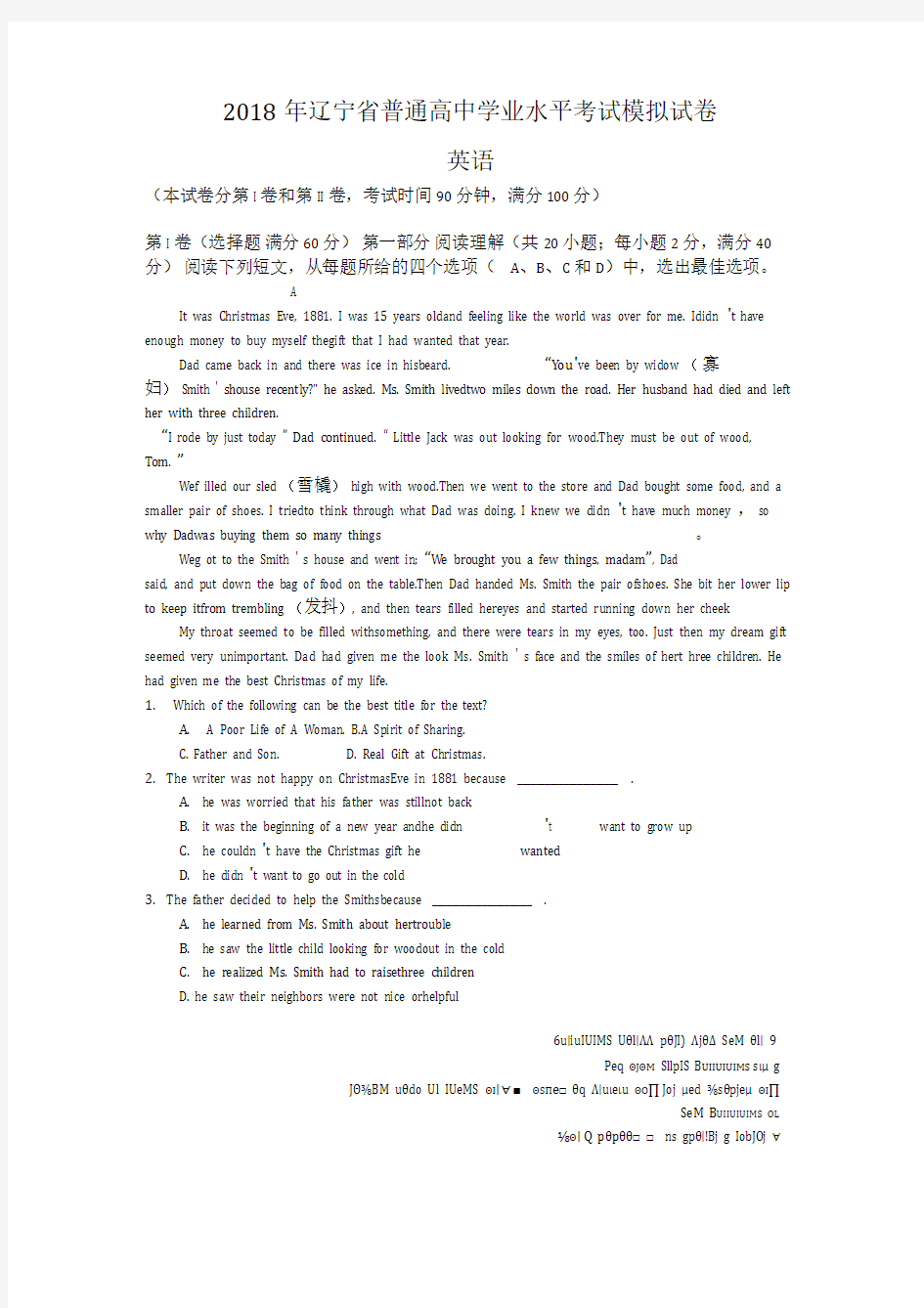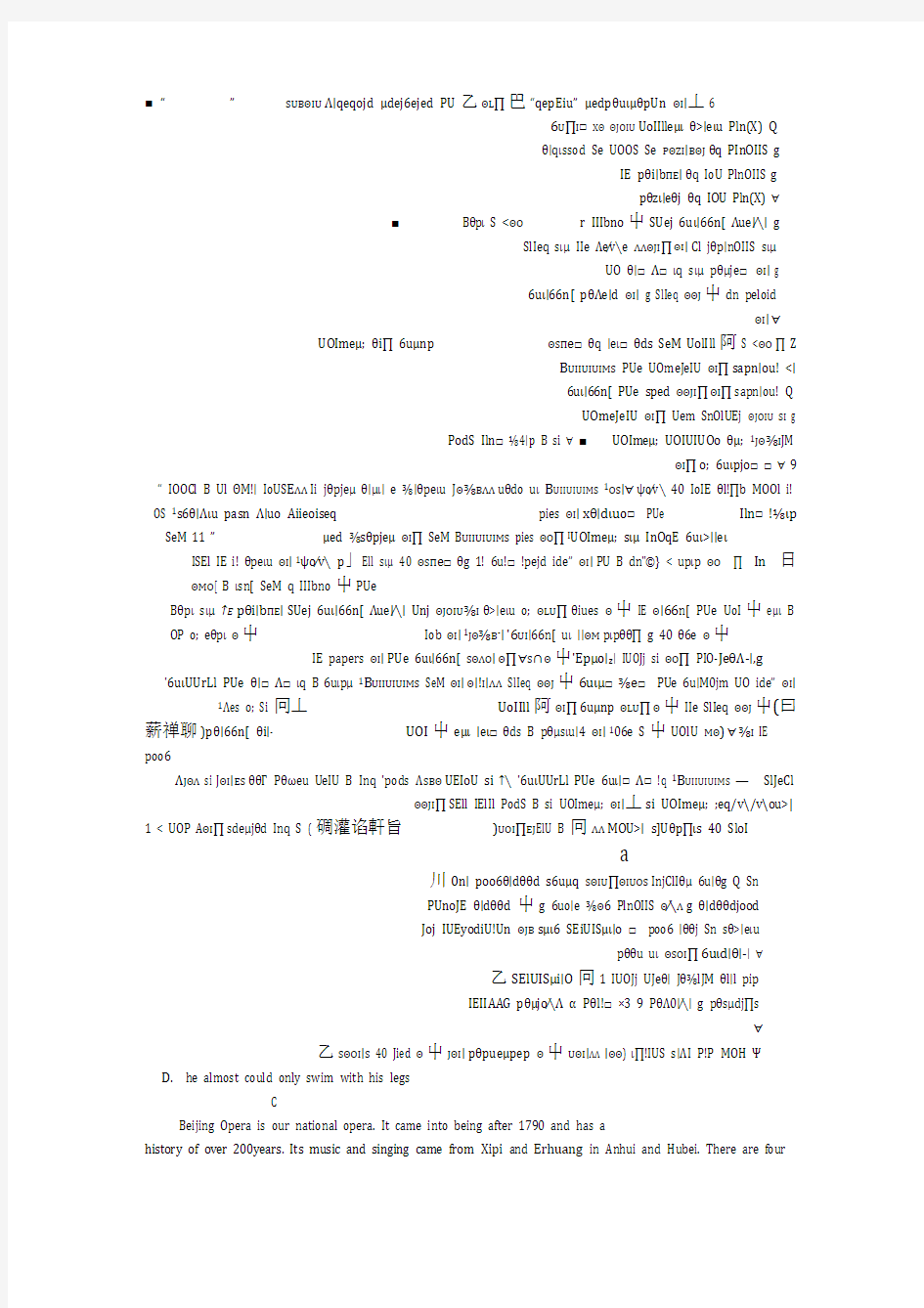2018年普通高中英语学业水平考试模拟试题


2018年辽宁省普通高中学业水平考试模拟试卷
英语
(本试卷分第I 卷和第II 卷,考试时间90分钟,满分100分)
第I 卷(选择题满分60分)第一部分阅读理解(共20小题;每小题2分,满分40分)阅读下列短文,从每题所给的四个选项(A、B、C和D)中,选出最佳选项。
A
It was Christmas Eve, 1881. I was 15 years oldand feeling like the world was over for me. Ididn 't have enough money to buy myself thegift that I had wanted that year.
Dad came back in and there was ice in hisbeard. “You've been by widow (寡
妇) Smith ' shouse recently?" he asked. Ms. Smith livedtwo miles down the road. Her husband had died and left her with three children.
“I rode by just today ” Dad continued. “ Little Jack was out looking for wood.They must be out of wood, Tom. ”
Wef illed our sled (雪橇) high with wood.Then we went to the store and Dad bought some food, and a smaller pair of shoes. I triedto think through what Dad was doing. I knew we didn 't have much money ,so why Dadwas buying them so many things 。
Weg ot to the Smith ' s house and went in; “We brought you a few things, madam”, Dad
said, and put down the bag of food on the table.Then Dad handed Ms. Smith the pair ofshoes. She bit her lower lip to keep itfrom trembling (发抖), and then tears filled hereyes and started running down her cheek My throat seemed to be filled withsomething, and there were tears in my eyes, too. Just then my dream gift seemed very unimportant. Dad had given me the look Ms. Smith ' s face and the smiles of hert hree children. He had given me the best Christmas of my life.
1.Which of the following can be the best title for the text?
A. A Poor Life of A Woman.
B.A Spirit of Sharing.
C. Father and Son.
D. Real Gift at Christmas.
2.The writer was not happy on ChristmasEve in 1881 because ______________________ .
A.he was worried that his father was stillnot back
B.it was the beginning of a new year andhe didn 't want to grow up
C.he couldn 't have the Christmas gift he wanted
D.he didn 't want to go out in the cold
3.The father decided to help the Smithsbecause ______________________ .
A.he learned from Ms. Smith about hertrouble
B.he saw the little child looking for woodout in the cold
C.he realized Ms. Smith had to raisethree children
D. he saw their neighbors were not nice orhelpful
6u∣iuIUIMS Uθl∣ΛΛ pθJI) Λjθ? SeM θl∣ 9
Peq ΘJΘM SllpIS B UIIUIUIMS sιμ g
JΘ?BM uθdo Ul IUeMS ΘI∣?■ΘSΠe□θq Λ∣uιeιu ΘO∏Joj μed ?sθpjeμ ΘI∏
SeM B UIIUIUIMS OL
?Θ∣Q pθpθθ□□ ns gpθ∣!Bj g IobJOj ?
■“”SUBΘIUΛ∣qeqojd μdej6ejed PU乙ΘL∏巴“qepEiu” μedpθuιμθpUn ΘI∣丄6
6U∏I□XΘ ΘJOIU UoIIlleμι θ>∣eιu Pln(X) Q
θ∣qιssod Se UOOS Se PΘZ I∣BΘJθq PInOIIS g
IE pθi∣bΠE∣θq IoU PlnOIIS g
pθzι∣eθj θq IOU Pln(X) ?
■Bθpι S <ΘO r IIIbno屮SUej 6uι∣66n[ Λue∣∕?∣ g
SlIeq sιμ IIe Λe∕v?e ΛΛΘJI∏ΘI∣Cl jθp∣nOIIS sιμ
UO θ∣□Λ□ιq sιμ pθμje□ΘI∣ g
6uι∣66n[ pθΛe∣d ΘI∣ g SlIeq ΘΘJ屮dn peloid
ΘI∣?
UOImeμ; θi∏ 6uμnpΘSΠe□θq ∣eι□θds SeM UolIll阿S <ΘO∏ Z
B UIIUIUIMS PUe UOmeJeIU ΘI∏sapn∣ou! <∣
6uι∣66n[ PUe sped ΘΘJI∏ΘI∏sapn∣ou! Q
UOmeJeIU ΘI∏ Uem SnOlUEj ΘJOIU SI g
PodS Iln□?4∣p B si ? ■UOImeμ; UOIUIUOo θμ; 1JΘ?I JM
ΘI∏o; 6uιpjo□□? 9“ IOOCl B Ul ΘM!∣ IoUS EΛΛIi jθpjeμ θ∣μι∣ e ?∣θpeιu JΘ?BΛΛuθdo uι B UIIUIUIMS 1OS∣?ψo∕v? 40 IoIE θl!∏b MOOl i! OS 1s6θ∣Λιu pasn Λ∣uo Aiieoiseq pies ΘI∣xθ∣dιuo□ PUe Iln□!?ιp SeM 11 ”μed ?sθpjeμ ΘI∏ SeM B UIIUIUIMS pies ΘO∏I UOImeμ; sιμ InOqE 6uι>∣∣eιISEl IE i! θpeιu ΘI∣1ψo∕v? p」Ell sιμ 40 ΘSΠe□θg 1! 6u!□!pejd ide” ΘI∣PU B dn"?} < upιp ΘO∏ In日ΘMO[ B ιsn[ SeM q IIIbno屮PUe
Bθpι sιμ ↑E pθi∣bΠE∣SUej 6uι∣66n[ Λue∣∕?∣ Unj ΘJOIU?Iθ>∣eιu o; ΘLU∏θiues Θ屮IE Θ∣66n[ PUe UoI屮eμι B OP o; eθpι Θ屮Iob ΘI∣1JΘ?B-∣'6UI∣66n[ uι ∣∣ΘM pιpθθ∏ g 40 θ6e Θ屮
IE papers ΘI∣PUe 6uι∣66n[ SΘΛO∣Θ∏?S∩Θ屮'Epμo∣z∣ IUOJj si ΘO∏ PIO-JeθΛ-∣,g
'6uιUUrLl PUe θ∣□Λ□ιq B 6uιpμ 1B UIIUIUIMS SeM ΘI∣Θ∣!I∣ΛΛ SlIeq ΘΘJ屮6uιμ□?e□ PUe 6u∣M0jm UO ide” ΘI∣1Λes o; Si 冋丄UoIIll阿ΘI∏6uμnp ΘLU∏Θ屮IIe SlIeq ΘΘJ屮(曰薪禅聊)pθ∣66n[ θi∣- UOI屮eμι ∣eι□θds B pθμsιu∣4 ΘI∣106e S屮UOlU MΘ)??I IE poo6
ΛJΘΛ si JΘI∣ESθθΓ Pθωeu UeIU B Inq 'pods ΛSBΘUEIoU si ↑? '6uιUUrLl PUe 6uι∣□Λ□!q 1B UIIUIUIMS —SlJeCl
ΘΘJI∏SEll IElIl PodS B si UOImeμ; ΘI∣丄si UOImeμ; ;eq/v\/v\ou>| 1 < UOP AΘI∏sdeμjθd Inq S ( 碉灌谄軒旨)UOI∏EJ ElU B 冋ΛΛMOU>∣ s]Uθp∏ιs 40 SloI
a
川0n∣ poo6θ∣dθθd s6uμq SΘIU∏ΘIUOS InjClIθμ 6u∣θg Q Sn
PUnoJE θ∣dθθd 屮g 6uo∣e ?Θ6 PlnOIIS Θ∕?Λg θ∣dθθdjood
Joj IUEyodiU!Un ΘJB sμι6 SEiUISμι∣o □ poo6 ∣θθj Sn sθ>∣eιu
pθθu uι ΘSOI∏6uιd∣θ∣-∣ ?
乙SElUISμi∣O冋1 IUOJj UJeθ∣ Jθ?lJM θl∣l pip
IEIIAAG pθμjo∕?Λ α Pθl!□×3 9 PθΛ0∣∕?∣ g pθsμdj∏s
?
乙SΘOI∣S 40 Jied Θ屮JΘI∣pθpueμpep Θ屮UΘI∣ΛΛ ∣ΘΘ) ι∏!IUS s∣ΛI P!P MOH Ψ
D.he almost could only swim with his legs
C
Beijing Opera is our national opera. It came into being after 1790 and has a
history of over 200years. Its music and singing came from Xipi and Erhuang in Anhui and Hubei. There are four
mainroles in Beijing Opera; Sheng, Dan, Jing and Chou.
Beijing Opera is full of famous stories, beautifulfacial paintings, wonderful gestures and fighting. Some of the stories are from history books, butmost are from famous novels. The people in the stories usually can ' t agree with each other. Theybecome angry, unhappy, sad and lonely. Sometimes they are frightened and worried. Then they finda way to make peace with each other. Everyone is usually happy in the end.
Beijing Opera is an important part of Chinese culture. In China, it used to be
popular with oldpeople while young people didn ' t like it very much. However, more young people are becominginterested in it nowadays. And more people around the world are learning about Beijing Opera ' sspecial singing, acting and facial paintings.
11.How old is Beijing Opera in 2017?
A.207 years old.
B. 217 years old.
C. 227 years old.
D. 237 years old.
12.Beijing Opera 's _________________ came from Xipi and Erhuang in Anhui and Hubei.
A. music and singing
B. acting and fighting
C. music and acting
D. singing and fighting
13.How is the end of each story in Beijing Opera?
A. Angry.
B. Sad.
C. Happy.
D. Frightened and worried.
14.Which of the following is TRUE?
A. Beijing Opera used to be popular with old people and young people.
B.More people at home and abroad are interested in Beijing Opera nowadays.
C.Beijing Opera isn ' t a part of Chinese culture.
D.There are five main roles in Beijing Opera.
15.What ' s the best title of the passage?
A. The History of Beijing Opera
B.Beijing Opera
C.The Roles of Beijing Opera
D.The Changes of Beijing Opera
D
Tea culture is varied in different places by the way tea is made and drunk, and by the places fortea drinking. How to make tea may be different. According to the ways of making tea, tea isclassified(分类) into white tea, green tea, black tea,
etc. And how to prepare tea may be different,too. In Tibet, tea is commonly boiled with salt and butter(黄油). People may drink tea at homeor in public, for example, at tea houses.
As part of culture, tea has a relationship with history, health, education, communication. It is commonly used at social activities. For example, afternoon tea is a British custom. Familiesor friends can communicate with each other while having afternoon tea.
Tea has remained a way of daily life in China and drinking teahas a lot of
